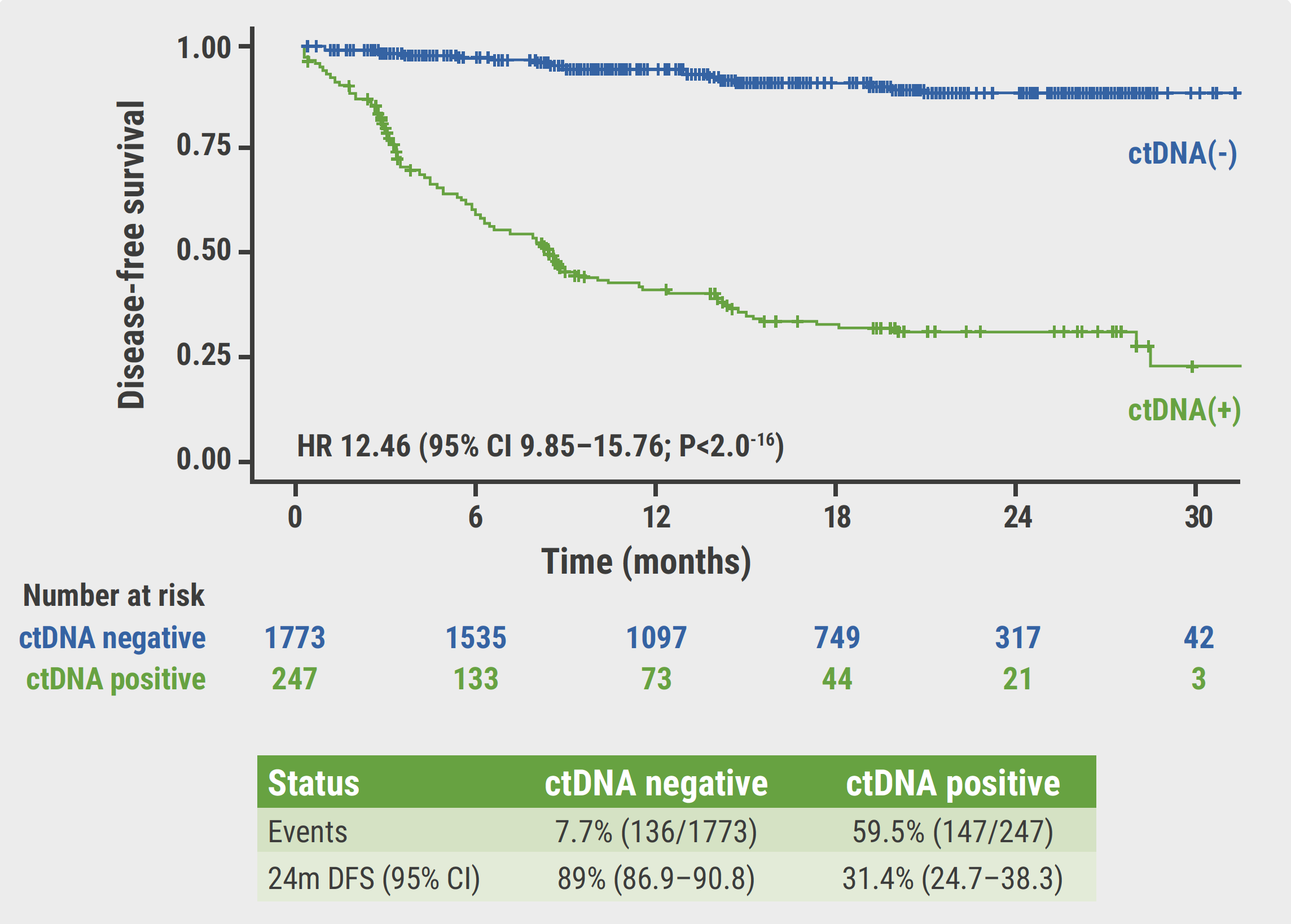https://doi.org/10.55788/e8684d07
With the current standard-of-care treatment, more than 30% of patients with resectable CRC relapse. Postoperative ctDNA analysis may enable the identification of molecular residual disease and thus drive subsequent risk stratification and adjuvant chemotherapy treatment decision-making. Preliminary results from the prospective, observational GALAXY study (UMIN000039205) previously demonstrated that postsurgical ctDNA positivity (at 4 weeks after surgery) was associated with higher recurrence risk and was the most significant prognostic factor associated with recurrence risk in patients with stage II or IV CRC [1]. Dr Yoshiaki Nakamura (National Cancer Centre Hospital East, Japan) presented updated results of the GALAXY study [2].
In GALAXY, postoperative ctDNA status was determined at 1, 3, 6, 9, 12, 18, and 24 months after surgery until a recurrence in 2,625 participants with stages II–IV CRC. Participants with ctDNA-negativity at the 4-week timepoint demonstrated a significantly inferior disease-free survival at 24 months compared with ctDNA-positive participants: 89.0% versus 31.4% (HR 12.46; 95% CI 9.85–15.76; P<0.0001, see Figure).
Figure: CtDNA status linked to disease-free survival during the molecular residual disease window of 30 months [2]

In stage II–III participants who were negative for ctDNA-negative, postoperative, adjuvant chemotherapy did not improve disease-free survival at 24 months (88.3% vs 89.9%). On the contrary, in stage II–III ctDNA-positive participants, postoperative, adjuvant chemotherapy improved disease-free survival at 24 months (38.6% vs 16.1%).
Based on these results, Dr Nakamura concluded that “postoperative ctDNA has a strong prognostic value for disease-free survival at 24 months. In addition, postoperative ctDNA-positive participants, but not ctDNA-negative participants, derive benefit from adjuvant treatment.”
- Kotani D, et al. Nat Med. 2023;29:127–134.
- Nakamura Y, et al. Circulating tumor (ct)DNA as a prognostic biomarker in patients (pts) with resected colorectal cancer (CRC): An updated 24 months (mos) disease free survival (DFS) analysis from GALAXY study (CIRCULATE-Japan). Abstract 558MO, ESMO 2023, 20–24 October, Madrid, Spain.
Copyright ©2023 Medicom Medical Publishers
Posted on
Previous Article
« Overall survival in patients with initially unresectable colorectal liver metastases does not depend on choice of induction regimen Next Article
Selective KRASG12C inhibitor sotorasib leads to superior PFS in colorectal cancer »
« Overall survival in patients with initially unresectable colorectal liver metastases does not depend on choice of induction regimen Next Article
Selective KRASG12C inhibitor sotorasib leads to superior PFS in colorectal cancer »
Table of Contents: ESMO 2023
Featured articles
The importance of detecting early NSCLC
Breast Cancer
Benefit of pembrolizumab in TNBC remains after 5 years of follow-up
Addition of pembrolizumab promising in early-stage high-risk ER+/HER2- breast cancer
Long-term air pollution exposure at both residential and workplace locations increases breast cancer risk
Third-line datopotamab deruxtecan improves progression-free survival in previously treated metastatic HR+/HER2- breast cancer compared with chemotherapy
Colorectal Cancer
Neoadjuvant nivolumab/relatlimab demonstrates 100% pathological response in MMRd colon cancer
Selective KRASG12C inhibitor sotorasib leads to superior PFS in colorectal cancer
Postoperative ctDNA predicts survival in colorectal cancer
Overall survival in patients with initially unresectable colorectal liver metastases does not depend on choice of induction regimen
Lung Cancer
Perioperative nivolumab boosts event-free survival in NSCLC
Selective RET inhibitor selpercatinib doubles progression-free survival in RET-mutated NSCLC
Dato-DXd outperforms docetaxel in previously treated patients with metastatic NSCLC
First-line and second-line benefit of amivantamab in advanced, EGFR-mutated NSCLC
Upper Gastro-Intestinal Cancer
Perioperative durvalumab/FLOT improves pCR in gastric cancer
Active surveillance after neoadjuvant chemoradiotherapy in oesophageal cancer
FOLFIRINOX equals gemcitabine-based chemoradiotherapy in neoadjuvant setting for pancreatic cancer
Modified FLOT regime outperforms FOLFOX in advanced/metastatic gastric/gastroesophageal junction adenocarcinoma
Melanoma
Lifileucel induces a durable response in heavily pretreated mucosal melanoma
Darovasertib/crizotinib combination: a potential first-line therapy in metastatic uveal melanoma
Genito-Urinary Cancers
Two potential new first-line standards of care in metastatic urothelial cancer
LuPSMA and enzalutamide: a promising combination
No benefit of erdafitinib over pembrolizumab in urothelial cancer second-line therapy
Gynaecological Cancers
Addition of atezolizumab to chemotherapy and maintenance PARP inhibitor has no benefit in ovarian cancer
Short-induction chemotherapy improves survival in advanced cervical cancer
Neoadjuvant immune checkpoint blockade safe and effective in MMRd endometrial cancer
Featured Interviews
Can radiotracers predict response to PD-L1 inhibitors in early NSCLC?
The importance of detecting early NSCLC
Related Articles
© 2024 Medicom Medical Publishers. All rights reserved. Terms and Conditions | Privacy Policy
HEAD OFFICE
Laarderhoogtweg 25
1101 EB Amsterdam
The Netherlands
T: +31 85 4012 560
E: publishers@medicom-publishers.com

